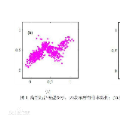Acute myeloid leukaemia (AML) is a type of blood and bone marrow cancer characterized by the proliferation of abnormal clonal haematopoietic cells in the bone marrow leading to bone marrow failure. Over the course of the disease, angiogenic factors released by leukaemic cells drastically alter the bone marrow vascular niches resulting in observable structural abnormalities. We use a technique from topological data analysis - persistent homology - to quantify the images and infer on the disease through the imaged morphological features. We find that persistent homology uncovers succinct dissimilarities between the control, early, and late stages of AML development. We then integrate persistent homology into stage-dependent Gaussian mixture models for the first time, proposing a new class of models which are applicable to persistent homology summaries and able to both infer patterns in morphological changes between different stages of progression as well as provide a basis for prediction.
翻译:暂无翻译



